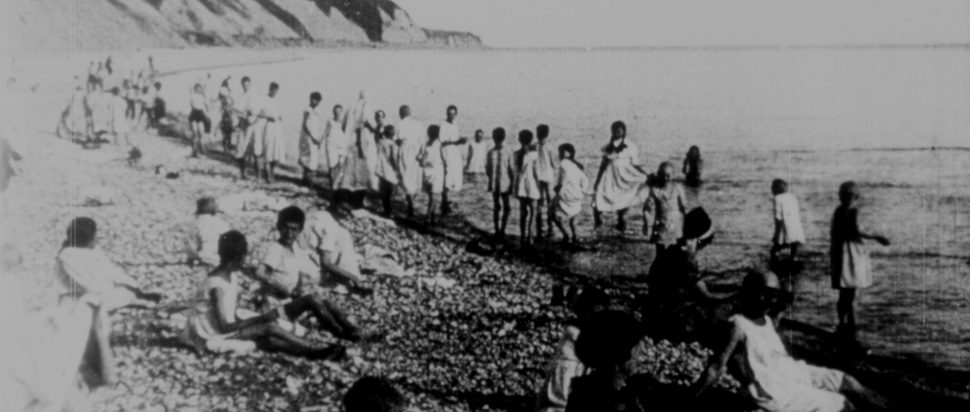Back in the News: Dziga Vertov’s Kino-Pravda at GSFF
Glasgow Short Film Festival present three episodes from Dziga Vertov's avant-garde newsreel series Kino-Pravda at this year's edition. We ask the series' curator, Matevž Jerman, why he wanted to contextualise this century-old news for a modern audience
The contemporary world is awash with a consistent torrent of video news. From terrestrial television broadcasts to YouTube and social media, from the MSM to ‘fake news’, the way that we consume our informational images is a constant source of discussion and debate in the present day. It can be difficult to remember that just a century ago the notion of moving image news was effectively a conceit of the avant-garde. Between 1922 and 1925, the legendary Russian filmmaker Dziga Vertov – director of the famous Man with a Movie Camera – helmed a ground-breaking newsreel series called Kino-Pravda. The Kino-Pravda 100 event at this year’s Glasgow Short Film Festival celebrates the centenary of the series by bringing together three episodes along with musical accompaniment from musician and Babe frontman Gerard Black.
Across the course of its original three-year run, Vertov clocked up 23 episodes of Kino-Pravda (the title approximately translating to ‘Film-Truth’) which he intended to be the equivalent of a newspaper up on the big screen. The 22 surviving episodes – which range in duration from just over five minutes to more than half an hour – were recently restored and digitised by the Vienna Filmmuseum. This caught the attention of the Slovenian curator Matevž Jerman, who first programmed a selection of the films at the FeKK Ljubljana Short Film Festival where he is programme director. He now brings them to Glasgow. “I was instantly fascinated by the idea of being able to present the programme at FeKK,” Jerman explains. He was thrilled at the idea of “equipping the screening of Vertov’s exactly-a-century-old newsreels with live contemporary music” and the additional interpretative layers that such a suggestion gives rise to.
“I was familiar with the famous Kino-Pravda newsreels,” Jerman continues, “but must admit that – like many other cinephiles [or] scholars – I had never actually seen the whole series. So, I engaged in a six-hour binge-watch.” Jerman was struck immediately by the extent to which the principles employed by Vertov a century ago still define our concept of what a documentary film entails. This brought Jerman to perhaps the most interesting part of putting together a screening like this. What does it mean to present and view century-old news footage as a modern viewer? “An important element during the selection process was the audience’s affinities and a dialogue with the present social condition. The episodes I settled on – No.7, No.10, and No.19 – are operating with a variety of topics that may indeed sound progressive even today, ranging from covering the trial of the Socialist Revolutionaries, streetcar incidents, and the All-Russian Olympiad, to the praising of Soviet working women."
While such topics can seem broadly relatable to a modern audience, there are also likely to be a range of subjects less easy to comprehend, particularly for viewers living far from Russia. Jerman agrees that it is essential to provide requisite historical context to viewers in situations such as this. “In order for the contemporary viewer to be able to embrace glimpses of Kino-Pravda’s urgent complexity – and establish a subjective but valid perspective – one must look at it from a different point of view compared to how we watch contemporary films.” Whether it is via accompanying articles on the festival website or through inviting knowledgeable speakers to introduce the films, there must be some attempt to offer a route through the material. Only by providing a framework to identify and acknowledge the ideological tendencies at play in this work can a viewer fully appreciate the power and poetry of what Vertov is doing and its place in a political landscape.
Perhaps this connects with why screenings such as Kino-Pravda 100 capture the imagination of contemporary audiences in the way they do: “In order to understand the present and shape the future, we first need to understand the past. On one side we have the subversive and empowering potential of Dziga Vertov’s or Santiago Alvarez’s newsreels, which is highly contagious. On the other side we have an insight into the apparatus of political propaganda, through the use of the moving image, giving insight into our own age flooded with visual content and fake news.”
Glasgow Short Film Festival presents Kino-Pravda No.7, No.10 and No.19 with a live score from Babe frontman Gerard Black, CCA Theatre, 25 Mar, 8.45pm
Junglehussi will be DJing after the screening, Saramago Terrace Bar, from 10pm
50% of the ticket income for this event will be donated to the Support Filmmakers At War fundraiser launched by Ukrainian political documentary collective Babylon’13. The fundraiser will support Ukrainian filmmakers, providing equipment and covering expenses, ensuring that the Russian invasion of Ukraine is documented from multiple perspectives.
Glasgow Short Film Festival runs from 23-27 Mar
